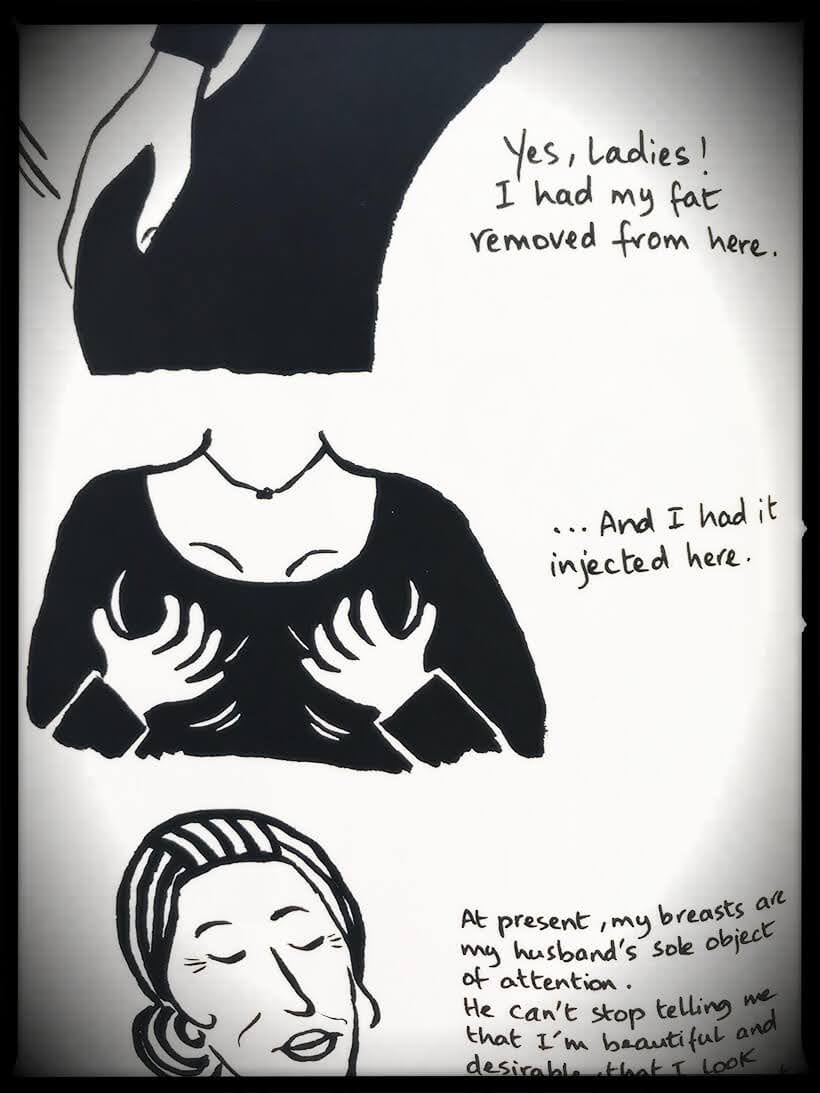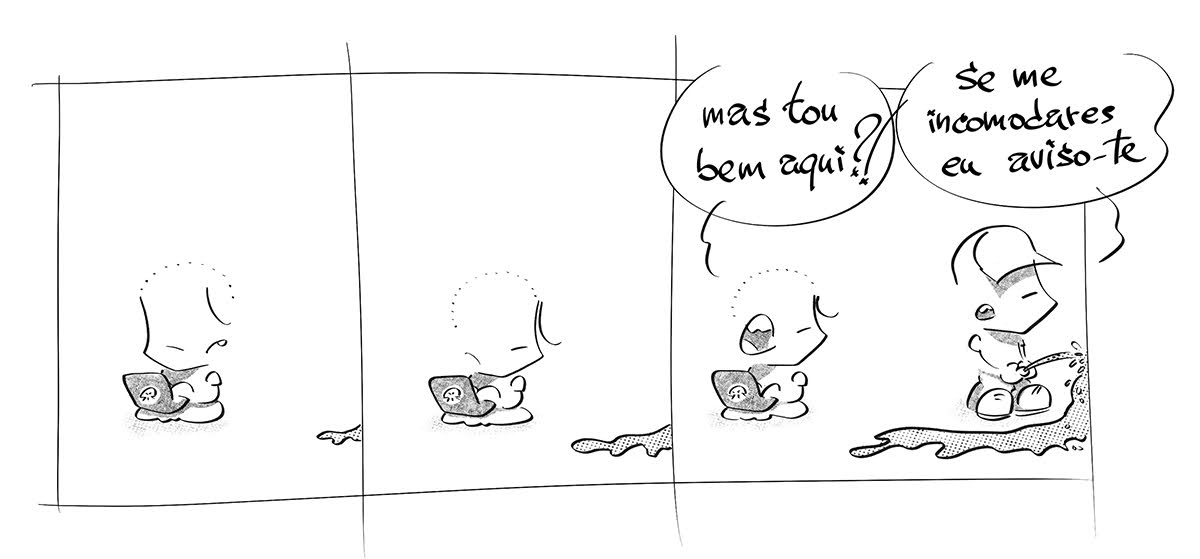território
 "Embroideries" de Marjane Satrapi
"Embroideries" de Marjane Satrapi ♪ When I was an alien ♪ Cultures weren't opinions ♪
♪ Never met a wise man ♪ If so it's a woman ♪
Omitimos último verso, mas vcs sabem qual é :)
Continuando de definições e cisões (*) Porque definir é cisar, senhores! da cultura, comics a exemplo.
Instead of forcing ourselves to sort between graphics as either high art or pablum, I introduce a more nuanced question of what modes it uses to relate to the larger culture it finds itself in and how they make use of it.
in "Are Marjane Satrapi's Works Comics or Graphic Novels?" 24 nov 2020
Conseguem a nossa atenção quando se interrogam dos usos a dar. A peça processada baseia-se num "Comics as a Minor Literature" 2016, mas... academia!, escolhemos antes citar pops, este publicado num portal intitulado Pop Matters 24 nov 2020: o zeitgeist always fornece.
A propósito dos "Persepolis" e "Embroideries" da Marjane Satrapi e hesitante entre os termos comics ou graphic novels —
in "Are Marjane Satrapi's Works Comics or Graphic Novels?" 24 nov 2020
- Comics: "I'm some pop junkie who never mentally left the fifth grade";
- Graphic novels: "I'm a pretentious hipster with a blog that nobody reads";
— diz-que-diz da dualidade de termos:
The discourse problematically leads to a specific bracketing of comics that not only rejects the study of comics as a medium in its own right, but fractures it into 'literary' and 'non-literary' works, at once elevating graphic novels to the position of literature and perpetuating the denigration of all other comics as mere pop culture entertainment in the process.
in "Are Marjane Satrapi's Works Comics or Graphic Novels?" 24 nov 2020
...propondo-se "to find a way that doesn't cling to one side or the other of this literary dichotomy, but escapes it altogether". A solução adiantada passa por um reaproveitamento de construções intencionadas noutras frentes (Franz Kafka, "but it is not difficult to extend their logic to other art forms including film, painting, and, of course, graphics" ) por Gilles Deleuze e Félix Guattari, nossos velhos amigos, que opõem à literatura dominante a chamada "minor literature" — e giggles aqui. O que nos importa dessas linhas tortas:
The set of questions that concerns Deleuze and Guattari when looking at minor literature is not whether the work is high or low, serious or juvenile, or even whether it works towards liberation or submission. The only thing that concerns them is if the literature in question provides "a line of escape or, rather, a simple way out, 'right, left or in any direction,' as long as it is as little signifying as possible".
The three characteristics of minor literature are "the deterritorialization of language, the connection of the individual to a political immediacy, and the collective assemblage of enunciation". Put in plainer language, the conditions of minor literature for Deleuze and Guattari are that it 1) be subversively constructed by some kind of marginalized voice within a majority language or majority culture 2) that it serves an immediate political end and 3) that it tends to set aside the individual authority of the author to enunciate the needs of some new people who, as a coalition, are in effect created by the work.
in "Are Marjane Satrapi's Works Comics or Graphic Novels?" 24 nov 2020
Ie, a criação de um outro espaço, que se mantém outro espaço.
The important thing to keep in mind when looking at the concept of minor literature is that its chief function is that it deterritorializes literature without reterritorializing it, the emphasis being on this resistance to reterritorialization. Most great art forms can accomplish what Deleuze and Guattari call deterritorialization, or what we might call in more standard critical theory, "disturbing the dominant ideology". The challenge, of course, is that if a work becomes popular enough, it will typically end up establishing new dominant ideologies, new kinds of status quos.
in "Are Marjane Satrapi's Works Comics or Graphic Novels?" 24 nov 2020
O perigo ao artsy-fartsy é evidente, como o é a alternativa óbvia, uma que coincide às intenções deste vosso espaço, arranque de post e dizeres do Matthew Arnold: que uso lhe damos,“through this knowledge, turning a stream of fresh and free thought upon our stock notions and habits”. Onde o artista morre muito sentido mas sem mudar hábitos, nova página roubada ao Scruton no Iluminismo para pistas à diferença:
A mais popular explicação do Iluminismo foi concebida por Marx. O Iluminismo pretendia ser o triunfo da razão sobre a superstição. Porém, Marx alegou que o seu verdadeiro triunfo não dizia respeito à esfera das ideias, mas à esfera da economia.
Roger Scruton in "A Cultura Moderna" 1998
Já neste século fizeram o caso pelo determinismo económico da cultura e o seu contra, não fazemos desse o nosso tópico para hoje, funny enough, mas o passe de magia no passo-ao-lado tornado possível em relação à cultura:
Ao definir a cultura como um subproduto de forças materiais (...) motivou um cinismo em relação à própria ideia de cultura. Passou a ser habitual encarar a cultura a partir de um ponto de vista exterior – não como um modo de pensar que define a nossa herança moral, mas como um disfarce elaborado, através dos quais os poderes artificiais se representam como direitos naturais. Graças a Marx, as teorias desmistificadoras da cultura tornaram-se parte integrante da cultura. Estas teorias identificam o poder como realidade e a cultura como máscara; além disso, preveem uma futura “libertação” das mentiras urdidas pelos nossos opressores.
Roger Scruton in "A Cultura Moderna" 1998
Há muito nos P+ que nos escusamos à banda desenhada por "uma outra cena", e embora não tenhamos ainda um nome para onde vamos, sabemos o que lá vamos fazer.

